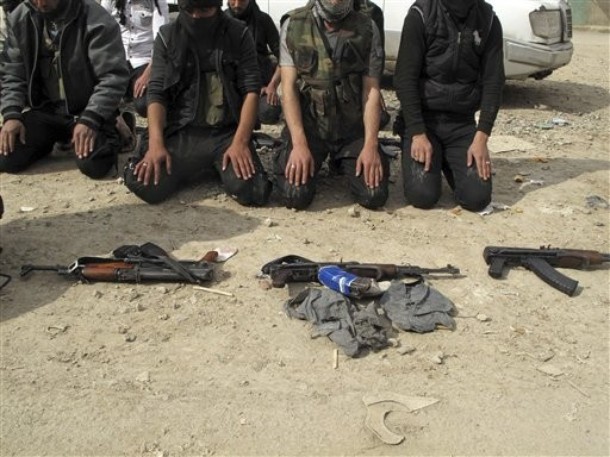Tolstoy writes in War and Peace; “What is the cause of historical events? Power. What is power? Power is the sum total of wills transferred to one person. On what condition are the wills of the masses transferred to one person? On condition that the person express the will of the whole people. That is, power is power.” What happens in Egypt and Syria these coming months will decide whether or not there is to be war or peace in the Middle East and tip the balance of power between Iran and Israel one way or another. If leaders emerge in Cairo and Damascus that are vehemently anti-Israeli then Iran will be strengthened and Israel more isolated than at any time since 1973. If leaders emerge that reject Iran’s interference, particularly that of the Iranian Revolutionary Guard in Syria, then Iran will be isolated and a new buffer established between Tel Aviv and Tehran. These are the geopolitical stakes.
In Egypt the Muslim Brotherhood is likely to emerge as the strongest political force. By far the best organized of the political parties now contesting the 23-24 May presidential elections the Muslim Brotherhood has said that in government it will honor all of Egypt’s international agreements. Equally, the mantra of the Brotherhood is decidedly Islamist in flavour, “God is our objective; the Koran is our constitution, the Prophet is our leader; Jihad is our way; and death for the sake of God is the highest of our aspirations”. Particularly strong in conservative rural areas there is little to suggest the Brotherhood are natural democrats. And, in spite of its Sunni roots there are also signs of improving relations between the Brotherhood and Shia Persian Iran on the basis that ‘my enemy’s (Israel) enemy is my friend (Iran)’. If that is indeed the case a Cairo regime controlled by the Brotherhood would rub uncomfortably against Israel’s southern border.
In Syria the situation is of course far more messy and far more deadly for the Syrian people who are dying daily in droves. With the Annan Peace Plan about to fail (and it will) and the UN Security Council profoundly split along the new fissure lines of grand politics Iran will be encouraged in its efforts to prop up the Assad regime. The Syrian opposition and the 40,000 strong Free Syrian Army are receiving at best verbal support from the West but little else. A mixture of the new geopolitics, US presidential elections, European strategic ineptitude, stabilization fatigue and a tendency now to see all conflicts as either a) humanitarian; and/or b) terrorism-generators (or both) rather than strategic calculation have led both America and Europe to miss the point – leaders therein are obsessed with the technology and have missed the strategy. Iran cares nothing for the fate of the regime or the Syrian people but if it can establish a puppet government in Damascus and change Egypt’s foreign and security policy orientation then Israel will again be surrounded by enemies and anti-Israeli proxies such as Hezbollah, Islamic Jihad and Hamas will be immeasurably strengthened. If that should happen (and it is still an ‘if’) expect Iran to start working to undermine the Hashemite Kingdom in Jordan and an already unstable Lebanese government.
The bottom-line is this; the West is missing the point of Iranian strategy. It is not to seek a direct nuclear confrontation with Israel but rather to divert the Arab Spring into a new anti-Israeli coalition which shifts the correlation of forces in Tehran’s favour and then work to foment a new Arab-Israeli war from which Persian Iran gains. Iranian nukes would simply provide a guarantee that Iran itself would not be attacked.
If Iran succeeds, war in the Middle East will become almost inevitable and likely sometime after the Egyptian and US presidential elections but before Iran begins to weaponize its nuclear program. Tel Aviv is fully aware of Iran’s ‘grand proxy war’ plan and will not permit Iran to simply dictate the pace, nature and direction of an anti-Israeli coalition.
The so-called EU 3+3 (Britain, France and Germany plus China, Russia and the US) will meet shortly to see if they can overcome their deep differences over how to dissuade Iran from its nuclear program. Little progress can be expected. However, they should at least consider the wider power context of Iran’s regional-strategic ambitions and what it could mean for war and peace in the Middle East. If not then the US and its European allies need to come together and consider their own actions.
As Tolstoy once said, “In historical events great men — so-called — are but labels serving to give a name to the event, and like labels they have the least possible connection with the event itself. Every action of theirs, that seems to them an act of their own free will, is in an historical sense not free at all, but in bondage to the whole course of previous history, and predestined from all eternity”.
Julian Lindley-French is Eisenhower Professor of Defence Strategy at the Netherlands Defence Academy, Fellow of Respublica in London, Associate Fellow of the Austrian Institute for European and Security Studies and a member of the Strategic Advisory Group of the Atlantic Council. He is also a member of the Academic Advisory Board of the NATO Defence College in Rome. This essay first appeared on his personal blog, Lindley-French’s Blog Blast.
Image: fsaprayer.jpg
